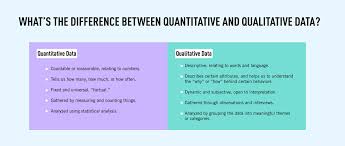The Power of Qualitative Data in Understanding the Human Experience
Qualitative data is a form of information that provides insights into human behaviour, emotions, experiences, and perceptions. Unlike quantitative data that focuses on numerical values and statistical analysis, qualitative data delves into the richness and depth of human experiences.
One of the key strengths of qualitative data is its ability to capture the complexity and nuances of human interactions. Through methods such as interviews, focus groups, observations, and open-ended surveys, researchers can gather detailed narratives that offer a deeper understanding of the factors influencing individual beliefs and actions.
Qualitative data is particularly valuable in fields such as psychology, sociology, anthropology, and market research where understanding human behaviour is essential. By analysing qualitative data, researchers can uncover underlying motivations, cultural influences, social dynamics, and personal perspectives that shape individuals’ decisions and attitudes.
Moreover, qualitative data allows for flexibility and adaptability during research processes. Researchers have the freedom to explore unexpected themes or follow up on intriguing responses in real-time. This dynamic approach fosters a more organic and holistic understanding of complex phenomena.
Interpreting qualitative data requires careful analysis and interpretation. Researchers must immerse themselves in the narratives collected, identify recurring patterns or themes, and contextualise findings within relevant theoretical frameworks. By synthesising diverse perspectives and voices, researchers can construct meaningful interpretations that shed light on the intricacies of the human experience.
In conclusion, qualitative data plays a vital role in uncovering the depth and richness of human experiences. By embracing diverse methodologies and engaging with participants authentically, researchers can gain profound insights that enhance our understanding of individual motivations, societal dynamics, and cultural complexities.
Six Essential Tips for Effective Qualitative Data Collection and Analysis
- Ensure data collected is relevant to your research objectives.
- Use open-ended questions to gather detailed responses.
- Maintain confidentiality and anonymity of participants’ responses.
- Thoroughly analyse the data for patterns and themes.
- Consider using software tools for coding and organizing qualitative data.
- Triangulate findings by comparing with other sources or methods for validation.
Ensure data collected is relevant to your research objectives.
To maximise the effectiveness of qualitative data analysis, it is crucial to ensure that the data collected directly aligns with your research objectives. By maintaining a clear focus on the key questions and goals of your study, you can gather information that is relevant, meaningful, and insightful. This targeted approach not only streamlines the analysis process but also enhances the validity and reliability of your findings. Selecting data that directly contributes to addressing your research objectives enables you to draw accurate conclusions and derive valuable insights that advance your understanding of the subject matter.
Use open-ended questions to gather detailed responses.
When collecting qualitative data, employing open-ended questions is a valuable strategy to elicit detailed and insightful responses from participants. By allowing individuals to express their thoughts and experiences in their own words, open-ended questions encourage rich narratives and nuanced perspectives. This approach not only captures the depth of participants’ insights but also provides researchers with a deeper understanding of the complexities underlying human behaviour and attitudes. The use of open-ended questions enhances the quality of qualitative data by fostering meaningful conversations and uncovering hidden nuances that quantitative data may not capture.
Maintain confidentiality and anonymity of participants’ responses.
It is crucial to uphold the confidentiality and anonymity of participants’ responses when collecting qualitative data. Respecting the privacy of individuals ensures their trust in the research process and encourages open and honest sharing of experiences. By safeguarding the identities of participants and ensuring that their responses remain confidential, researchers demonstrate ethical conduct and protect sensitive information. Maintaining confidentiality also helps create a safe environment for participants to express their thoughts and feelings without fear of repercussion, ultimately contributing to the integrity and validity of the research findings.
Thoroughly analyse the data for patterns and themes.
When working with qualitative data, it is crucial to conduct a thorough analysis to uncover underlying patterns and themes. By meticulously examining the collected data, researchers can identify recurring trends, common threads, and significant insights that may not be immediately apparent. This process of in-depth analysis allows for a deeper understanding of the nuances within the data, enabling researchers to draw meaningful conclusions and extract valuable insights that contribute to a comprehensive understanding of the research topic.
Consider using software tools for coding and organizing qualitative data.
When working with qualitative data, researchers can benefit greatly from utilising software tools for coding and organising the information collected. These tools offer efficient ways to categorise, annotate, and analyse qualitative data, making the process more systematic and manageable. By using software for coding, researchers can easily identify patterns, themes, and relationships within the data, enhancing the depth of analysis and facilitating a more comprehensive understanding of the research findings. Additionally, these tools enable researchers to organise vast amounts of qualitative data in a structured manner, streamlining the research process and ensuring that valuable insights are not overlooked.
Triangulate findings by comparing with other sources or methods for validation.
Triangulating findings by comparing them with other sources or methods is a crucial tip in qualitative data analysis. By validating the results obtained from one source against those from different sources or methodologies, researchers can enhance the credibility and reliability of their conclusions. This process of cross-referencing helps to confirm patterns, themes, or insights that emerge from the data, providing a more robust and comprehensive understanding of the phenomenon under study. Ultimately, triangulation strengthens the validity of qualitative research findings and reinforces the confidence in the interpretations drawn from the data.




